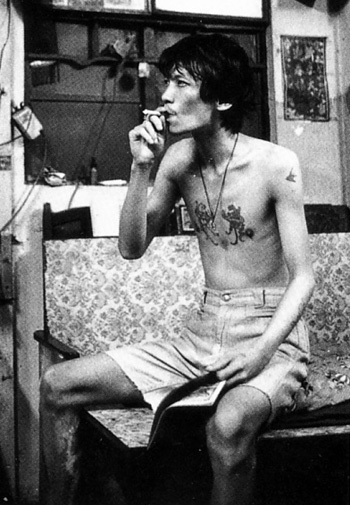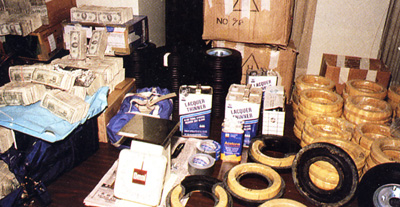Chinese Mafia Takes Vice Abroad
By Stephen Brookes in New York and Washington, DC • Insight Magazine • April 24 ,1989
Officials said it was the biggest heroin bust in U.S. history. Following an intensive, 18-month investigation, federal and local authorities in New York decisively smashed an international Hong Kong-based drug ring in February, seizing 800 pounds of pure high-grade heroin and arresting 26 persons, including ringleader Fok Leung Woo. It was a dramatic bust, offering "clear proof," as U.S. Attorney Andrew Maloney noted, that Chinese gangs have become the dominant smugglers of heroin into the United States.
 The problem, say Western law enforcement authorities, is already advanced: Chinese crime organizations have built up what the Justice Department recently called "a sophisticated and intricate network world-wide that can facilitate any type of criminal endeavor - virtually anywhere."
The problem, say Western law enforcement authorities, is already advanced: Chinese crime organizations have built up what the Justice Department recently called "a sophisticated and intricate network world-wide that can facilitate any type of criminal endeavor - virtually anywhere."
Those fears are focusing new attention on the murky subculture of the Hong Kong triads. Violent, quasi-mystical groups that are bound together with to-the-death loyalty vows and bloodletting rituals, the triads have pervaded Hong Kong's economic life for decades, running complex networks of legitimate and criminal businesses. The latter activities range from extortion, gambling, prostitution and drug smuggling to arson, contract murder, robbery and fraud.
First emerging in the late 17th century with the aim of overthrowing the Manchu rulers of the Ching dynasty, the triads (they take their name from a mystical relationship thought to exist between man, earth and heaven) gradually degenerated into criminal societies with an elaborate code of rituals, vows and secret ceremonies. Fleeing China in 1949 after Mao Tse-tung's victory over the Kuomintang and the subsequent purge in which hundreds of triad members were executed, the remnants of the gangs reassembled in Taiwan and Hong Kong, where they prospered hugely.
Members are reputed to hold prominent places throughout the economy, even at high levels of business and the legal profession. "Joining a triad society is not only beneficial from an economic perspective, but also gives a kind of prestige," says Ko-Lin Chin, an investigator with the New York City Criminal Justice Agency who has studied triad society in depth. “And you can establish a lot of good business connections by being a triad member."
 The problem, say Western law enforcement authorities, is already advanced: Chinese crime organizations have built up what the Justice Department recently called "a sophisticated and intricate network world-wide that can facilitate any type of criminal endeavor - virtually anywhere."
The problem, say Western law enforcement authorities, is already advanced: Chinese crime organizations have built up what the Justice Department recently called "a sophisticated and intricate network world-wide that can facilitate any type of criminal endeavor - virtually anywhere."Those fears are focusing new attention on the murky subculture of the Hong Kong triads. Violent, quasi-mystical groups that are bound together with to-the-death loyalty vows and bloodletting rituals, the triads have pervaded Hong Kong's economic life for decades, running complex networks of legitimate and criminal businesses. The latter activities range from extortion, gambling, prostitution and drug smuggling to arson, contract murder, robbery and fraud.
First emerging in the late 17th century with the aim of overthrowing the Manchu rulers of the Ching dynasty, the triads (they take their name from a mystical relationship thought to exist between man, earth and heaven) gradually degenerated into criminal societies with an elaborate code of rituals, vows and secret ceremonies. Fleeing China in 1949 after Mao Tse-tung's victory over the Kuomintang and the subsequent purge in which hundreds of triad members were executed, the remnants of the gangs reassembled in Taiwan and Hong Kong, where they prospered hugely.
Members are reputed to hold prominent places throughout the economy, even at high levels of business and the legal profession. "Joining a triad society is not only beneficial from an economic perspective, but also gives a kind of prestige," says Ko-Lin Chin, an investigator with the New York City Criminal Justice Agency who has studied triad society in depth. “And you can establish a lot of good business connections by being a triad member."
... chinese crime organizations, say police, have become so sophisticated they can operate virtually anywhere in the entireworld ...
Nevertheless, Hong Kong has been stepping up its fight against the groups since 1983, drawing up anti racketeering legislation and wiping out much of the corruption that had plagued the police force for years. “During the 1970s, a lot of police officers themselves were triad members,” says Chin. “It's very difficult to fight them if you have senior officials who are themselves triad members.”
The Hong Kong police deny that deals have been cut and say American fears that the triads are preparing for mass resettlement in the United States are, if not unjustified, at least unproved. “While there's been an upsurge in Chinese crime abroad since about 1970, there is no evidence to support this cry of exodus,” says Merritt.
A growing number of U.S. officials believe that the transfer is well under way. “Gang members that were active with triads in Hong Kong and Taiwan are being smuggled into the U.S. to continue to ply their trade in the streets of New York,” Immigration and Naturalization Service Commissioner Alan C. Nelson told a House select committee studying the problem.
The relationship between tongs and triads remains unclear. While no structural relationship between the American tongs and the Hong Kong triads seems to exist, tong members swear the same 36 oaths of loyalty that triad members do and bow to the god of triad societies. Moreover, says Chin, “some tong members also belong to triads, so they may be spiritually related. Both follow the norms and values of the triad subculture.” Clifford Wong, the elected leader of the Tung On tong, is a known member of the Sun Yee On triad in Hong Kong, says Goldman.
Concern about a triad exodus is not limited to the United States. A 1988 report on organized crime by Canada's Criminal Intelligence Service noted that triads have become one of the country's most dangerous organized crime groups. Based primarily in Vancouver and Toronto, where the main Asian communities are, the groups are said to be spreading to smaller cities like Calgary and Winnipeg. "We've got about 17 different triad groups in Canada, with about 700 documented gang members,” says Superintendent Douglas Egan of the Royal Canadian Mounted Police. "We're sure there are links between these groups and others back in Hong Kong, as well as marriages of convenience between different organizations."
"Our number one national problem is drug trafficking," says Carmel Chow, one of six investigators from the Independent Commission Against Corruption in Hong Kong working for Australia's National Crime Authority. "Triad members have been illegally migrating to Australia, and the problem is getting worse." He says 90 percent of the heroin being smuggled into Australia is handled by about nine groups affiliated with parent organizations in Hong Kong.
The heroin that feeds that expansion, authorities say, will come from Asia. Opium crops in the so-called Golden Triangle, Southeast Asia's drug-producing center, are hitting unprecedented levels.
The Hong Kong police deny that deals have been cut and say American fears that the triads are preparing for mass resettlement in the United States are, if not unjustified, at least unproved. “While there's been an upsurge in Chinese crime abroad since about 1970, there is no evidence to support this cry of exodus,” says Merritt.
A growing number of U.S. officials believe that the transfer is well under way. “Gang members that were active with triads in Hong Kong and Taiwan are being smuggled into the U.S. to continue to ply their trade in the streets of New York,” Immigration and Naturalization Service Commissioner Alan C. Nelson told a House select committee studying the problem.
The relationship between tongs and triads remains unclear. While no structural relationship between the American tongs and the Hong Kong triads seems to exist, tong members swear the same 36 oaths of loyalty that triad members do and bow to the god of triad societies. Moreover, says Chin, “some tong members also belong to triads, so they may be spiritually related. Both follow the norms and values of the triad subculture.” Clifford Wong, the elected leader of the Tung On tong, is a known member of the Sun Yee On triad in Hong Kong, says Goldman.
Concern about a triad exodus is not limited to the United States. A 1988 report on organized crime by Canada's Criminal Intelligence Service noted that triads have become one of the country's most dangerous organized crime groups. Based primarily in Vancouver and Toronto, where the main Asian communities are, the groups are said to be spreading to smaller cities like Calgary and Winnipeg. "We've got about 17 different triad groups in Canada, with about 700 documented gang members,” says Superintendent Douglas Egan of the Royal Canadian Mounted Police. "We're sure there are links between these groups and others back in Hong Kong, as well as marriages of convenience between different organizations."
"Our number one national problem is drug trafficking," says Carmel Chow, one of six investigators from the Independent Commission Against Corruption in Hong Kong working for Australia's National Crime Authority. "Triad members have been illegally migrating to Australia, and the problem is getting worse." He says 90 percent of the heroin being smuggled into Australia is handled by about nine groups affiliated with parent organizations in Hong Kong.
The heroin that feeds that expansion, authorities say, will come from Asia. Opium crops in the so-called Golden Triangle, Southeast Asia's drug-producing center, are hitting unprecedented levels.

Operation White Mare netted 800 pounds of pure heroin"In 1985, Asian heroin represented only about 14 percent of the U.S. market; now it's up around 40 or 42 percent," says Tobin. "The last two years have seen record crops in the Golden Triangle, and the one coming out now is expected to be even higher." Production in Burma, the area's main opium producing country, has grown by as much as 50 percent since last year, with much of the new cultivation being run by the Burma Communist Party to fund its operations.
But the Drug Enforcement Administration is not convinced that triads themselves are masterminding the drug trade. "There are many, many triad members in the heroin business, but no evidence that a triad runs a heroin trafficking organization,” says Tobin, who says that perhaps a dozen Asian drug kingpins are behind the smuggling rise. "These people are criminals with a lot of money. They don't have any allegiance to some society -- they're all independents."
Nevertheless, given Hong Kong's virtually uncontested role as the world center of high-grade heroin smuggling and drug money laundering, triad involvement exists at almost all levels of the trade. The amount of the drug seized there has grown from 12.5 kilograms in 1985 to 161 kilos last year, and Hong Kong supports an addict population estimated to be about 40,000.
Part of the appeal to smugglers is Hong Kong's ready supply of light manufacturing facilities and cheap labor, which make it an ideal place to repackage the heroin in commercial shipments of manufactured products, which is how most of it enters the United States.
"It might come into Hong Kong on a fishing trawler from Bangkok, then be repackaged in Hong Kong and sent in radios or ashtrays to Singapore, Seoul, any number of places, for transshipment," says Tobin. "And if you look at the number of commodities coming into New York from Hong Kong, it's impossible to check.”
No comments:
Post a Comment
Comments always welcome!